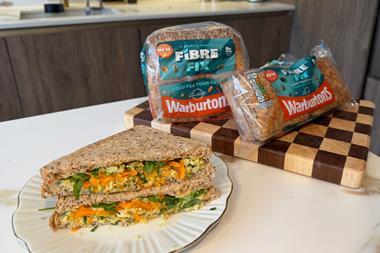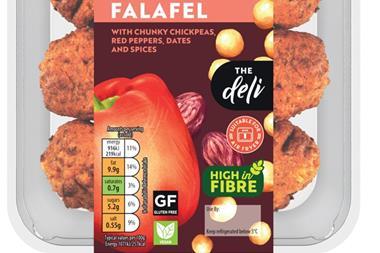
A report commissioned by health secretary Matt Hancock has recommended that unhealthy foods should have cigarette-style plain packaging unless the food and drink industry drastically steps up its efforts on reformulation.
The proposals, by chief medical officer Sally Davies, say the voluntary reformulation programme has, like its predecessor the Responsibility Deal, failed to tackle the obesity crisis and calls on ministers to turn to regulation.
Davies also calls for an expansion of the sugar levy to other products, and for a radical overhaul of the VAT system to make healthy products cheaper than unhealthy ones.
Her report comes weeks after a review by Public Health England (PHE) found the industry stood virtually no chance of hitting its target of cutting sugar by 20% by next year, whilst plans for a voluntary clampdown on calories have yet to get off the ground.
Food companies have warned the government they have been swamped with impossible and competing targets over sugar and calorie reduction, but the new report calls for the programme to be “accelerated” and for companies that fail to step up to be hit with new taxes.
Davies told ministers they should not “shy away from regulation” and if food and drink companies fail to hit the ramped-up targets for sugar and calories by 2021 and 2024 respectively, the government should turn to “a fiscal lever or standardised packaging (as for tobacco)”.
The report recommends the immediate extension of the soft drinks levy to added-sugar milk-based drinks, a move the government has so far shied away from. It also raises the prospect of the levy being extended to other categories such as biscuits, chocolate confectionery, ice creams & lollies and puddings, which the recent PHE report showed were massively behind the targets to reduce sugar.
“The levy has successfully driven reformulation and taken sugar out of children’s drinks,” said Davies, who added there was “no evidence” it had impacted on deprived groups, whilst increases in the price of soft drinks had been “minimal”.
PHE’s report last month revealed whilst the overall reduction in the first two years of the programme, from 2015 to 2017, stood at just 2.9% based on sales weighted average data, by comparison products covered by the soft drinks tax achieved reductions of almost 30% in the same period.
The report said progress under the voluntary reformulation programme, overseen by PHE, had “overall been disappointing”. It added: “Voluntary approaches can be hard on business, particularly those that are trying to sell healthy products, as the playing field is not level. They also tend to be less effective, as was the experience with the Responsibility Deal.”
As well as extension of the sugar tax, the CMO’s report calls for a post-Brexit overhaul of the VAT system which would allow the government to make healthy food cheaper than unhealthy options.
“Following the UK’s exit from the EU, an urgent review of VAT rates on food and drink should take place with input from the DHSC,” it said.
“The review should aim to rebalance the cost of food and drink in favour of health. It should consider a tiered VAT approach so the unhealthiest products have a higher rate of VAT which could be used to subsidise healthy food, starting with fruit and vegetables.”
She said the current VAT system was loaded with examples of unintended unhealthy consequences, such as a gingerbread man with chocolate-covered trousers being subject to VAT, but not if it has chocolate eyes.
Likewise chocolate chip cookies and biscuits coated with caramel (made from sugar) remain zero-rated, whilst biscuits with chocolate covering are standard-rated at 20%.
As well as increased regulation for supermarkets and suppliers, Davies said the government should bring in new restrictions on the out-of-home sector to “level the playing field”.
The report said there should be mandatory regulations across the OOH sector including consistent nutrition labelling on all menus and product shelf labels, and mandatory uptake of the traffic light front-of-pack nutrition labelling system.
The moves would also include restrictions on the location of junk food outlets near schools, as well as mandatory caps and multi-buy restrictions.
Last month PHE admitted its data for OOH sugar reduction had been marred by poor uptake and lack of reliable data.
Reacting to today’s report, retailers and suppliers said the CMO was wrong to say voluntary attempts at reformulation had failed.
“Retailers, including food to go, have led the way on tackling obesity, reformulating tens of thousands of products to reduce levels of sugar, fat and salt, as well as improving labelling on food and drink to ensure that consumers can find important nutritional information,” said Andrea Martinez-Inchausti, assistant director of food at the BRC.
She added: “We agree with the report that schools have an important part to play in tackling obesity. Both in terms of delivering healthy and nutritious meals to children, and by supporting efforts to increase exercise levels among young people.”
“UK food and drink manufacturers are working hard to implement what has already been asked of them by government in three chapters of a Childhood Obesity Plan published in just three years,” said Kate Halliwell, FDF head of UK diet and health policy.
“FDF member companies are committing time and resource to deliver the government’s various reformulation programmes - cutting salt, sugars and calories.
“In fact, FDF members are selling 57.3 million fewer kilograms of sugars and one trillion fewer calories than they were back in 2015.
“As PHE acknowledge, reformulating products takes time, and we must always take the consumer with us. We want government to support us in this work and not introduce punitive measures which might hinder it.
“We agree more needs to be done to tackle obesity, and welcome the report’s clear steer that everyone needs to play their part, including schools, local councils and the NHS. Manufacturers alone will not solve this. We believe money should be put behind specific, targeted measures for those most affected by the burden of obesity.”
However, campaigners said it was time for regulation to replace the “chaos” of voluntary obesity action by firms.
“The report sends a clear message to businesses. In amongst the current chaos, businesses need certainty, and what this does is propose a level playing field through regulation, so leaders aren’t left stranded by voluntary efforts that rarely work,” said Barbara Crowther, coordinator of Sustain’s Children’s Food Campaign.
Katharine Jenner, nutritionist and campaigns director at Action on Sugar added: “”Professor Davies’ brave call for ‘bold action’ is a beacon of hope and her sound recommendations are precisely what’s required if we are to ever achieve the government’s target to half childhood obesity in 10 years.
Key to this, and outlined in Professor Davies’ report, is the urgent need to take unhealthy food and drink out of the spotlight by restricting promotions and marketing - this simply cannot be achieved without legislation. There is no magic bullet to reverse the rise in childhood obesity, but the Government’s Childhood Obesity Plan was supposed to deliver a range of measures that could have a significant impact such as calorie reductions, a ban on junk food displayed at the checkouts and of energy drinks to children, calorie labelling on restaurant and café menus, and for the sugary drinks levy to be extended to sugar milk drinks. Legislation and fiscal measures are not always politically popular, but that doesn’t mean they aren’t right; the unprecedented results of the sugary drinks levy speak for themselves.”



















No comments yet